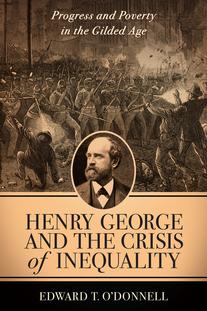Social Biography of a Reformer in Gilded-Age America
Henry George and the Crisis of Inequality
Edward T. O'Donnell, Professor, Holy Cross College
This is a social biography of the reformer Henry George and his most important years of public activism in the 1880s. Born in 1839, Henry George grew up in Philadelphia and later moved to California where he became a journalist. In the 1870s, he became deeply troubled by the increase in poverty and social tension across the nation even as industrialization benefitted many and enriched a few. He responded by writing a book (Progress and Poverty (1879)) that addressed the vexing question of “Why did industrial progress seem to increase poverty and social inequality rather than diminish it?” His answer was a land monopoly. Large corporations, Wall Street wizards, and land speculators, he argued, had seized control of the most basic resource needed for economic success and upward mobility. As a result, the average American worker and farmer found himself slipping into low-paid wage work and despair, a process that threatened to destroy the republican society established by the Founding Fathers. His solution was the "single tax" on land values. While not everyone supported this solution, vast numbers of Americans, especially wage workers, read Progress and Poverty and came to accept its critique of laissez-faire industrial society. As a result, in the early 1880s, George went from obscure San Francisco editor to a nationally (indeed, internationally) recognized social reformer. The culmination of this remarkable rise came in 1886 when George was nominated as the candidate for Mayor of New York City by the United Labor Party. Whereas labor party candidates in this period usually garnered a few hundred votes, George stunned observers by polling over 68,000 and nearly winning the election (he finished ahead of the Republican candidate, the young Theodore Roosevelt).

Henry George and the Crisis of Inequality examines both the rise of Henry George and his influence on the era, but also the wider context of Gilded Age America and the social turmoil and bitter debates over how best to control an industrial system that produced unprecedented progress and wealth, but also unprecedented levels of poverty, suffering, and alienation. Through it all what emerges is a compelling case for seeing Henry George as one of the first and one of the most influential social reformers in the Gilded Age whose writings and activism prodded Americans to conclude that a laissez-faire economy and minimalist government, while appropriate for the agrarian economy of the Founding Fathers' generation, spelled doom for the modern American republic in the age of industry. In other words, Henry George played a key role in promoting the idea that some level of government intervention in the economy, what the next generation of reformers would call "progressivism", was necessary for the maintenance of America's republican society and its revered principles of equality and the common good.